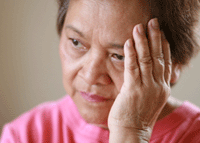 |
||||
Menopause Depression - How To Understand And Treat Menopausal DepressionWomen are at the sharp end when it comes to suffering with depression. More than a quarter experience a major depression at some stage of their lives, and far more antidepressant drugs are prescribed to women, than to men. You'd think that the menopause must be at least partly to blame, but in fact there's no hard and fast evidence to show that it's the menopause that causes women's depression. Unbalanced hormones and declining oestrogen levels may have some impact on mental wellbeing, but often women in their forties and fifties are also re-assessing their lives. It's a stage when women surface after all-engulfing years of child-rearing or career-building to find themselves getting older and wondering - what now? If you take a long hard look at your life, and don't like what you see - or don't know where to head next - that can be enough to tip you towards a menopause depression. What is menopause depression?
Perimenopausal depression can spring up as a sign that all is not well in your life. Somewhere you're suffering the effects of stress because of an imbalance, or an unresolved sorrow or anger. Perhaps you've lost your sense of purpose and joy in life. Maybe you feel unfairly burdened by other people's demands, with little or no time to tend to your own needs, or you feel stuck in a job or a relationship that no longer satisfies and nurtures you. Yes, your fluctuating hormone levels and your symptoms of menopause, if strong or uncomfortable, can contribute to a menopausal depression. But it pays to look to the underlying causes, if you want to be free of depression and are willing to make the necessary changes in your life. Effects of menopause depressionDepression had many effects, physical and mental. It:
Find out more about the warning signs of menopause depression, and how to deal with depression. Explore the treatments for depression. These include natural remedies for depression and ways to adjust your diet to help with depression and use exercise to combat depression. Go back to the top of Menopause Depression. Return from Menopause Depression to Beat Menopause Weight Gain. |
OUR FREE REPORT!
Get the Healthy Eating Habit and Lose Weight For Ever 
We hate spam and will never give away or sell your email address |
|||
|
|
||||
FEEL GOOD IN YOUR BODY!Beat-menopause-weight-gain.com does not offer medical advice. Please consult your physician before making any changes to your usual lifestyle.View our Terms of Use and Privacy Policy |
||||
|
Beat Menopause Weight Gain - Feel Good in Your Body! - All Rights Reserved - Copyright© 2008-2012
| ||||



